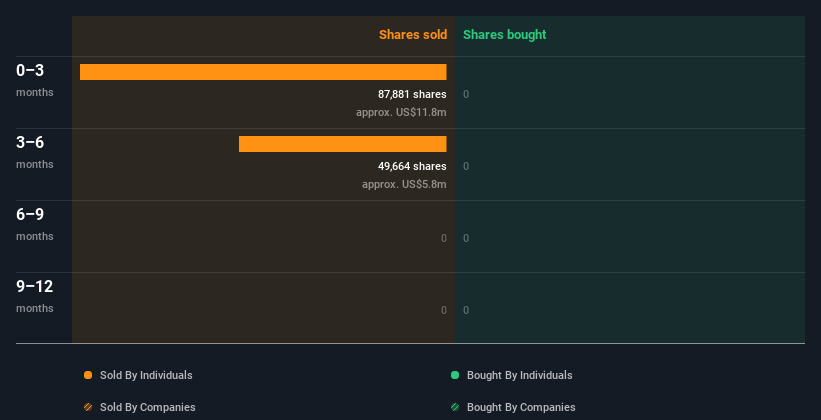DexCom Insiders Sold US$18m Of Shares Suggesting Hesitancy
Many DexCom, Inc. (NASDAQ:DXCM) insiders ditched their stock over the past year, which may be of interest to the company's shareholders. When evaluating insider transactions, knowing whether insiders are buying versus if they selling is usually more beneficial, as the latter can be open to many interpretations. However, when multiple insiders sell stock over a specific duration, shareholders should take notice as that could possibly be a red flag.
While insider transactions are not the most important thing when it comes to long-term investing, logic dictates you should pay some attention to whether insiders are buying or selling shares.
View our latest analysis for DexCom
DexCom Insider Transactions Over The Last Year
In the last twelve months, the biggest single sale by an insider was when the Executive Chairman, Kevin Sayer, sold US$4.6m worth of shares at a price of US$124 per share. That means that even when the share price was below the current price of US$131, an insider wanted to cash in some shares. We generally consider it a negative if insiders have been selling, especially if they did so below the current price, because it implies that they considered a lower price to be reasonable. However, while insider selling is sometimes discouraging, it's only a weak signal. This single sale was just 13% of Kevin Sayer's stake.
In the last year DexCom insiders didn't buy any company stock. You can see a visual depiction of insider transactions (by companies and individuals) over the last 12 months, below. By clicking on the graph below, you can see the precise details of each insider transaction!
For those who like to find winning investments this free list of growing companies with recent insider purchasing, could be just the ticket.
Insiders At DexCom Have Sold Stock Recently
The last quarter saw substantial insider selling of DexCom shares. Specifically, insiders ditched US$12m worth of shares in that time, and we didn't record any purchases whatsoever. Overall this makes us a bit cautious, but it's not the be all and end all.
Insider Ownership Of DexCom
I like to look at how many shares insiders own in a company, to help inform my view of how aligned they are with insiders. We usually like to see fairly high levels of insider ownership. DexCom insiders own 0.4% of the company, currently worth about US$207m based on the recent share price. This kind of significant ownership by insiders does generally increase the chance that the company is run in the interest of all shareholders.
So What Does This Data Suggest About DexCom Insiders?
Insiders sold stock recently, but they haven't been buying. And there weren't any purchases to give us comfort, over the last year. But since DexCom is profitable and growing, we're not too worried by this. The company boasts high insider ownership, but we're a little hesitant, given the history of share sales. In addition to knowing about insider transactions going on, it's beneficial to identify the risks facing DexCom. At Simply Wall St, we found 1 warning sign for DexCom that deserve your attention before buying any shares.
Of course DexCom may not be the best stock to buy. So you may wish to see this free collection of high quality companies.
For the purposes of this article, insiders are those individuals who report their transactions to the relevant regulatory body. We currently account for open market transactions and private dispositions of direct interests only, but not derivative transactions or indirect interests.
Have feedback on this article? Concerned about the content? Get in touch with us directly. Alternatively, email editorial-team (at) simplywallst.com.
This article by Simply Wall St is general in nature. We provide commentary based on historical data and analyst forecasts only using an unbiased methodology and our articles are not intended to be financial advice. It does not constitute a recommendation to buy or sell any stock, and does not take account of your objectives, or your financial situation. We aim to bring you long-term focused analysis driven by fundamental data. Note that our analysis may not factor in the latest price-sensitive company announcements or qualitative material. Simply Wall St has no position in any stocks mentioned.

 Yahoo Finance
Yahoo Finance 
